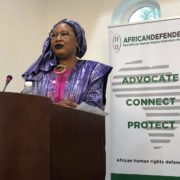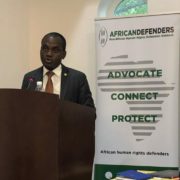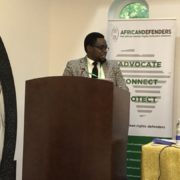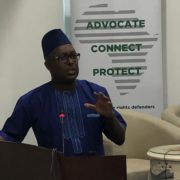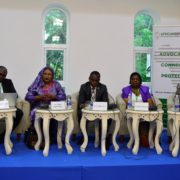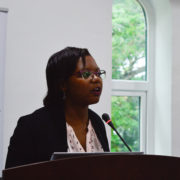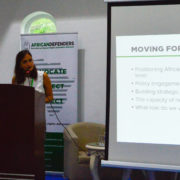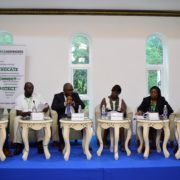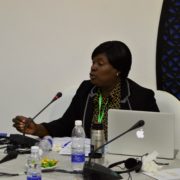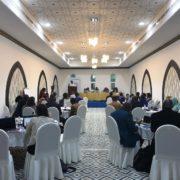
18 June, 2019
Communique on the AfricanDefenders Convention (Johannesburg+20 Conference)
1. Twenty years after the All African Human Rights Defenders Conference held in Johannesburg in 1999, AfricanDefenders (the Pan African Human Rights Defenders Network) convened the AfricanDefenders Convention (Johannesburg+20) from 12-14 June 2019 in Zanzibar, United Republic of Tanzania.
2 . The Convention brought together human rights defenders (HRDs) from all the regions of Africa, more specifically representatives from the sub-regional HRD networks and national HRD coalitions, steering committee members, and key stakeholders. The Convention also included the Chairperson of the African Commission on Human and Peoples’ Rights (the Commission), the Special Rapporteur for HRDs in Africa, and the President of the African Court on Human and Peoples’ Rights (African Court).
3. The objective of the Convention was to take stock of the progress made since the adoption of the Kampala Declaration of Human Rights Defenders and the Kampala Plan of Action (KAPA), adopted at the All Africa Human Rights Defenders Conference (Johannesburg +10) in 2009. In addition to taking stock, the participants shared experiences and lessons learnt, and designed new strategies reflecting the trends and developments since Johannesburg +10.
4. Mr. Onesmo Olengurumwa, Executive Director of the Tanzania Human Rights Defenders Coalition (THRDC) and local host of the Convention, gave his welcoming remarks, including an overview of the crucial work of THRDC to protect HRDs amidst the shrinking civic space in Tanzania. He expressed hope that the three-day reflection would result in effective strategies for the engagement of African HRDs with the African human rights system.
5. Mr. Hassan Shire, Chairperson of AfricanDefenders and Executive Director of DefendDefenders (the East and Horn of Africa Human Rights Defenders Project), gave his welcoming remarks, appreciating THRDC for hosting the meeting. He underscored the capacity and protection gaps of African HRDs at the inception of AfricanDefenders, the milestones achieved over the years, and the need to urgently address the remaining gaps. To address the online civic space shift, he recalled the importance of innovation, emphasising the need to equip HRDs with digital tools to allow for free expression, association and assembly. He highlighted the Ubuntu Hub Cities initiative, which facilitates the relocation of at-risk African HRDs on the continent.
6. In his keynote address, Honourable Justice Sylvain Ore, the President of the African Court, emphasised the importance of building synergies between African regional human rights mechanisms, including the African Court and HRDs, to advance the common interest of promoting and protecting human rights.
7. In her keynote address, Honourable Soyata Maiga, the Chairperson of the Commission, welcomed the topicality of the Convention, as the African human rights system, and the Commission in particular, is facing significant challenges. She underscored the need to fend for the regional system to meet the standards set out in Aspiration 3 of the African Union (AU) Agenda 2063. She recognised the efforts of HRDs who persevere amidst the restrictive operating environment, and called for the need for self-reflection to identify new strategies.
8. The first panel discussion of the Convention centred on the engagement by HRDs with the African human rights system. Moderated by Ms. Achieng Akena, Executive Director of the International Refugee Rights Initiative (IRRI), the conversation traversed the continental and international mechanisms for the protection of HRDs, including the Commission, the Court, and Special Mandates. During the discussion, Hon. Maiga elaborated on the existing protection mechanisms available for HRDs in Africa, and the need to create a safe working environment for HRDs, free from the fear of reprisals. Ms. Margaret Sekaggya, former UN Special Rapporteur on HRDs, discussed protection gaps for HRDs, highlighting the need to domesticate international human rights instruments. Hon. Prof. Rémy Ngoy, the Special Rapporteur on HRDs and Focal Point on Reprisals in Africa, deliberated on HRDs’ engagement with the Commission despite the backlash from states and on the Commission’s Resolution 69 on the protection of HRDs in Africa, drawing attention to its five major pillars. President Ore, on his part discussed the existing avenues for engagement with the African Court on protection of HRDs, calling for the need to advocate for the ratification of the African Court Protocol and State declarations, and ensuring increased visibility for the Court.
9. Drawing in HRDs into the dialogue, Ms. Achieng posed specific questions to participants. Some of the issues identified included: the need for a road map between the different human rights mechanisms and HRDs and their formations; challenges with accessing the available mechanisms; communication setbacks between the mechanisms and HRDs; resource constraints; the need for other AU organs to play a proactive role to strengthen the African human rights system; and the need for capacity building for HRDs on existing mechanisms.
10. With a view to distilling the outcomes of the panel conversation, the participants carried out group work discussions to further analyse the gaps and challenges in the protection of Human Rights Defenders in Africa, and provided concrete recommendations to improve the effectiveness of the system. The groups made the analysis within the following thematic framework: 1. gaps in knowledge of the existing mechanisms 2. gaps occasioned by a lack of political commitment by states, 3. gaps in the institutional framework (instruments and mechanisms), and 4. gaps in the implementation of treaties, decisions and roadmaps.
11. The second day of the Convention was opened by Mr. Donald Deya, Chief Executive Officer of the Pan African Lawyers Union (PALU), giving an overview of the previous day’s deliberations. This was followed by a panel on AfricanDefenders’ renewed vision and the hub cities concept with Ms. Memory Bandera, Director of Programmes and Administration, and Mr. Joseph Bikanda, Co-ordinator of AfricanDefenders’ Secretariat. Ms Bandera took stock of the achievements of AfricanDefenders over the past decade, examining its protection responses, advocacy and research initiatives, capacity building strategies, and efforts to enhance its visibility. She also highlighted the challenges affecting the effectiveness of AfricanDefenders. Mr. Bikanda, on his part, explained the Ubuntu Hub Cities initiative as a protection measure for the relocation of HRDs at risk on the African continent, and identified the existing hub cities in Kampala, Tunis, Abidjan, Pretoria, Johannesburg, and Cape Town.
12. When opened to the plenary, conveners welcomed the important progress made by the Secretariat and raised questions pertaining to the Ubuntu Hub Cities initiatives. Responses from the AfricanDefenders secretariat clarified the criteria for the eligibility of HRDs to be relocated under the initiative and for the selection of existing hub cities. The secretariat also expressed commitment to continue to strengthen and expand the initiative, with a focus on the inclusion of Lusophone HRDs.
13. Ms. Hannah Forster, Executive Director of the African Centre for Democracy and Human Rights Studies (ACDHRS), moderated the panel discussion on the Marrakesh Declaration, and the role of National Human Rights Institutions (NHRIs) and non-governmental organisations (NGO) in protecting and promoting HRDs in Africa. In the panel discussion, Hon. Ngoy reflected on the importance of the Marrakesh Declaration, and of strategic coordination between HRDs and NHRIs. Ms. Sekaggya discussed the mandate of NHRIs, as set out in the Paris Principles, and recommended, among other things, that HRDs should advocate for an HRD desk within their respective NHRIs. Mr. George Morara, Commissioner of Kenya National Commission on Human Rights (KNCHR), stressed the need for NHRIs to focus on marginalised HRDs. Mr. Arnold Tsunga, the Chairperson of the Southern African Human Rights Defenders Network, and Mr. Edmund Yakani, Chairperson of the South Sudanese Human Rights Defenders Network, presented innovative ways for HRDs to collaborate with NHRIs. To crystallise the discussions, the participants carried out group work to analyse avenues to enhance the co-operation between HRDs and NHRIs. Of the many challenges and recommendations presented, the need for NHRIs to be independent, autonomous from the government, and pluralistic was stressed.
14. Mr. Joseph Bikanda, gave an overview of the main action points of KAPA, and invited participants to form working groups to reflect on how to best adapt the action plan to reflect the current human rights environment. The groups focused on four main thematic areas respectively: partnerships and networking; research, advocacy, and strategic litigation; protection; and capacity building.
15. The day was closed with a candlelit silent vigil to express solidarity with HRDs and people of Sudan amid the ongoing violence and crackdown on protesters in the country.
16. The third day of the Convention opened with presentations by group rapporteurs, highlighting key points of the group discussions from the previous day. On the basis of group recommendations, the KAPA was reviewed in plenary, and the reviewed document, KAPA+10, was adopted with consensus. Mr. Tsunga led a discussion on the way forward, and the main outcome of that was instructions to the secretariat to develop a strategic plan to facilitate implementation of the KAPA +10.
17. In his closing remarks, Mr. Shire thanked all conveners for fruitful three-day deliberations. He announced a steering committee meeting and the third edition of AfricanDefenders’ Shield Awards, to take place later that day, to recognise outstanding HRDs for their impact on the protection and promotion of human rights. He officially closed the meeting.




